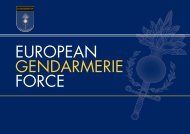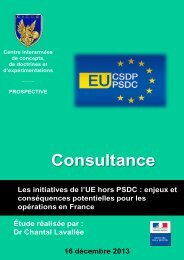Conference
science-research-bulletin-2013-conference
science-research-bulletin-2013-conference
You also want an ePaper? Increase the reach of your titles
YUMPU automatically turns print PDFs into web optimized ePapers that Google loves.
EUROPEAN POLICE SCIENCE AND RESEARCH BULLETIN<br />
SPECIAL CONFERENCE EDITION<br />
however, the GSOC are actually advocating<br />
amending legislation to enable it, refers the<br />
offence cases back to the Garda for investigation<br />
(GSOC, 2012, para.3.6). Interestingly, the Garda<br />
is stoutly resisting that proposal.<br />
Similarly, in England and Wales the IPCC directly<br />
investigates less than 1 % of complaints (HAC,<br />
2010). The remainder is referred back to the<br />
police for investigation, with options for the IPCC<br />
to supervise or manage the investigation and of<br />
the complainant to complain to the IPCC about<br />
the manner of the police investigation. That,<br />
however, cannot be described as an independent<br />
complaints system in any meaningful sense. The<br />
HAC was deeply critical of this operation. It was<br />
strongly of the view that:<br />
‘Most cases should be investigated independently<br />
by the Commission, instead of referred back to<br />
the original force on a complaints roundabout.<br />
“Supervised investigations” do not offer rigorous<br />
oversight of a police investigation, nor do they<br />
necessarily give the public a convincing assurance<br />
that the investigation will be conducted<br />
objectively. This kind of “oversight-lite” is no<br />
better than a placebo.’ (HAC 2013, para.23)<br />
Significantly, a relatively high number of<br />
complaints against the police investigation are<br />
upheld by the Commission (HAC, 2013, para.60.<br />
RELIANCE ON POLICE RESOURCES<br />
Even where complaints are investigated directly<br />
by the independent Commissions, it does not<br />
follow that the investigations are independent<br />
of the police. The reality on the grounds is that<br />
the independent investigators are often heavily<br />
dependent on police or police related expertise<br />
in the conduct of their investigations (Savage,<br />
2013a; HAC, 2013). This is especially true in<br />
cases involving fatalities or serious injury to the<br />
person; the very cases in which the European<br />
Court of Human Rights has emphasised the<br />
importance of the investigation being conduct<br />
independently of the police (Hammerburg,<br />
2009). The problem starts at the point where<br />
the incident is alleged to have occurred. The<br />
fact is that the Commissions do not have the<br />
personnel or the resources spread across the<br />
country to ensure that they get to the scene as<br />
quickly as police investigators. Almost invariably,<br />
therefore, they must rely on the police colleagues<br />
of the officers being investigated to secure the<br />
scene and preserve evidence. If the investigation<br />
requires the application of specialised skills such<br />
as traffic accident reconstruction, ballistics and<br />
even fingerprint analysis, the Commissions will<br />
almost invariably have to rely on the police to<br />
provide them as they will not normally have them<br />
in house. Similarly, for forensic and DNA analyses<br />
they normally have to rely on agencies that<br />
work closely with the police force in question.<br />
Even at a more basic level, as will be seen<br />
later in the context of regulatory capture, the<br />
independent investigators are usually dependant<br />
on the cooperation of the police for the supply<br />
of documentary, video, electronic, and/or oral<br />
evidence central to the investigation.<br />
It would almost be perverse to describe<br />
investigations conducted in such circumstances<br />
as independent of the police. This is tacitly<br />
acknowledged by the report of the HAC inquiry<br />
which explicitly linked the IPCC’s capacity to<br />
take control of a potential crime scene with the<br />
quality of its investigations:<br />
‘When the IPCC does investigate it often comes<br />
too late and takes too long. The trail is left to<br />
go cold. IPCC should be able to take immediate<br />
control of a potential crime scene during the<br />
crucial “golden hours” and early days of an<br />
investigation into deaths and serious injury<br />
involving police officers.’ (HAC, 2013, para.24)<br />
It went on to assert that the IPCC’s involvement in<br />
death and serious injury cases was far too remote<br />
as it lacked access to independent specialists<br />
who could analyse a possible crime scene. This,<br />
in turn, meant that important cases were under<br />
investigated (HAC, 2013, para.33). Similarly,<br />
GSOC has explicitly and publicly linked its<br />
capacity to deliver its investigative function with<br />
access to the Garda PULSE and computerised<br />
information bases. (GSOC, 2013a, para.10.4) The<br />
PULSE system incorporates a central information<br />
database to which operational gardai input data<br />
on crime incidents etc. in the course of their<br />
duties. Garda have direct electronic access to it,<br />
and it is a vital resource in any investigation into<br />
a complaint or criminal matter. The Commission,<br />
however, has no independent access. It must<br />
depend on Garda cooperation to extract<br />
information from PULSE on a case by case basis.<br />
In a special report to the Minister in 2013, it<br />
tersely recommended, inter alia, that it should be<br />
given independent access immediately (GSOC,<br />
2013a, rec.21)<br />
53





